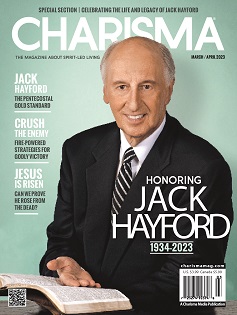The 7 Last Words of Christ
As believers, we have hope that can only be found in Christ and His resurrection. But first came the cross. This was no pristine appeasement. Rather, it was the Roman empire’s brutal version of capital punishment.
Man had rebelled against God, and the penalty had to be paid. In the Father’s plan, sin and its punishment were transferred onto Jesus, His only Son.
“Christ has redeemed us from the curse of the law by being made a curse for us—as it is written, “Cursed is everyone who hangs on a tree” (Gal. 3:13). The curse of the cross meant alienation from God, but Jesus took our place and suffered God’s wrath.
The seven last words or sayings of Jesus reveal His heart for humanity and His desire to be with the Father.
‘Forgive Them’
“‘Father, forgive them, for they know not what they do'” (Luke 23:34).
Especially when viewed from our human “get even” perspective, the first recorded words from the cross are insightful and instructional. Jesus had been tortured with the derision and mocking of the religious and political leaders, soldiers and bystanders.
Jesus’ tormentors were all worthy of some sort of ground-swallowing public display of judgment. But His first call was to His Father, who from the beginning of time had ordained this moment and orchestrated this journey. Today, in our despair and need, our first cry should be “Father!”
Then Jesus said, “Forgive them.” He had been beaten, spit upon and mocked. His beard had been pulled out. He had been paraded, stumbling through the dusty streets like an animal. The flesh on His back lay raw, exposing organs and bone. Blood from the thorns trickled into His eyes. Nails pierced His hands and feet. Yet He said, “Forgive them!”
But for whom was He asking forgiveness? The politicians? Corrupt religionists? Soldiers? Mockers and scorners? The one who wove the thorns into that cruel crown? The men who drove the nails? This call was meant for all of them, but also meant for all who have lived and breathed on this earth. Here, the gravity of Romans 5:8 becomes real: “But God demonstrates His own love toward us, in that while we were yet sinners, Christ died for us.”
When He says, “They know not what they do” (Luke 23:34b), we again see ourselves as dead in our sins (see Col. 2:13).
‘You Will Be With Me’
“Today you will be with Me in paradise” (Luke 23:43b).
Jesus hung on the cross between two guilty thieves, and yet His second utterance is full of love.
One of the thieves blurted out, “If you are the Christ” (no doubt delivered as if to say, “If you are really the Christ”), “save yourself and us!” (Luke 23:39b).
Then, someone speaks—but it is not Jesus. The other thief rebuked the blasphemer. “Do you not fear God, seeing you are under the same sentence? And we indeed, justly. For we are receiving the due reward of our deeds” (Luke 23:40b-c).
This conversation had gone from one side of the crucifixion scene to the other, with Jesus in the middle. But the thief who rebuked the other then addressed Jesus, “Lord, remember me when You come into Your kingdom” (Luke 23:42).
Reality had set in. This man had no hope to get off that cross. He called out to Jesus in a spirit of repentance.
Of all the questions that day, Jesus responded only to this one. His reply was simple but direct, “Truly, I tell you, today you will be with Me in Paradise” (Luke 23:43). Boom! Consider it done.
This is the same precious one who had said, “he who comes to Me, I will never cast out” (John 6:37).
Today, it’s easy to say many believe about Him without believing in Him. But at the cross, the thief believed in Him, and Jesus detoured his eternal damnation into blessing.
‘Here Is Your Mother’
“[Jesus] said to His mother, ‘Woman, here is your son.’ Then He said to the disciple, ‘Here is your mother'” (John 19:26b-27a). In these words, we see compassionate love on wondrous display.
None of the Gospels reports any utterances from Mary that day. There were no histrionics or loud displays of grief. Her hurt ran deep.
But Mary knew this day would come. Perhaps her mind went back to the day she and Joseph brought baby Jesus to the temple. As Simeon saw the promised one, he rejoiced. Then, in his blessing, he singled out Mary.
“Then Simeon blessed them and said to Mary His mother, ‘Listen, this Child is destined to cause the fall and rising of many in Israel and to be a sign which will be spoken against, so that the thoughts of many hearts may be revealed. And a sword will pierce through your own soul also'” (Luke 2:34-35).
It is possible she did not understand the full ramifications of those words in that moment. But at Calvary, she did.
The third character in this scene is John, or as he generously refers to himself, “the disciple whom He loved” (John 19:26b).
John was tuned to love. Having John and Mary together in that moment was no accident.
Jesus said to His mother, “Woman, here is your son” (John 19:26c). Although He loved her for her role in His life, He now changed the focus of their relationship. Even Mary said, “my spirit rejoices in God my Savior” (Luke 1:47). When He tells her to behold her son, He is not speaking about Himself but about John.
Then Jesus said to John, “Here is your mother!” (John 19:27a). The verse continues, “From that time, this disciple took her to his own home” (John 19:27b). He had entrusted His mother to the only one of the 12 who stayed with Him at the cross.
‘Why Have You Forsaken Me?’
“My God, my God, why have you forsaken me?” (Matt. 27:46b).
Jesus’ other words had been of forgiveness and concern. But this cry came from His core!
Despite the crowd, He was now truly alone. Just the night before, Jesus had celebrated and served His 12 disciples. Although they had pledged undying allegiance, He told them they would desert Him, “Yet I am not alone, for the Father is with Me” (John 16:32c).
Only three and a half years before, He had heard His Father’s public pronouncement, “This is my beloved Son, in whom I am well pleased” (Matt. 3:17b). But now the One who “knew no sin” was alone, something He had never experienced. While bearing the world’s sin, He embodied the often- flippant description: “godforsaken.”
Here we see divine justice at work. Sin’s penalty was real, and this just man was dying for the unjust. In His most depleted state, He was abandoned.
Today, we can take comfort, knowing this same Jesus is touched by our lost and lonely cries. He has been there.
Jesus saw how sin hurts, destroys and separates us from the Father. And now that we have viewed His grief on startling display, how can we entertain sin?
‘I Thirst’
“I thirst” (John 19:28b).
As a result of the scourging, exertion of carrying the cross, horror of the nails and loss of blood, breathing and speaking were painful. He was depleted. Drained. Dry. He carried no magic God-card to release Him from what had to be done; it was the Father’s master plan.
Now, the one who had created water needed water. Even His thirst had been prophesied years before: “My strength is dried up like a potsherd, and my tongue cleaves to my jaws; and You have set me toward the dust of death” (Ps. 22:15).
Earlier in the day, He was offered a medicinal drink but refused it (see Mark 15:23).
Later, when our suffering Lord said, “I thirst” (John 19:28c), the soldier’s response was not as thoughtful. “A bowl full of sour wine was there. So they put a sponge full of sour wine on hyssop and held it to His mouth” (John 19:29). Again, this soured-wine vinegar, meant as a cruel blow, fulfilled another prophetic word: “in my thirst they gave me vinegar to drink” (Ps. 69:21b).
In His tender encounter with the woman at the well, Jesus had already connected the need for natural water to the need for soul-satisfaction: “but whoever drinks of the water that I shall give him will never thirst” (John 4:14a).
Nothing compares to a dry, thirsty soul. O, how a refreshed soul rejoices!
The real thirst in our soul is the desperation for His touch and His presence. “As the deer pants after the water brooks, so my soul pants after you, my God” (Ps. 42:1).
Jesus said it, and beloved brother John recorded it: “He who believes in Me, as the Scripture has said, out of His heart shall flow rivers of living water” (John 7:38).
‘It Is Finished’
“It is finished” (John 19:30b).
After His cries of suffering, a different cry emerged. It was a loud and clear message, a cry of victory on every level. It thrust a defiant fist in the face of hell.
The devil and his demons had vomited all the evil they could muster yet remained powerless in taking Jesus’ life. Hell had failed. And when He thundered, “It is finished,” the earth shook!
It is finished in the completion of the plan that had started in the garden. God told the serpent He would “put enmity between you and the woman, and between your offspring and her offspring; he will bruise your head, and you will bruise his heel” (Gen. 3:15).
It is finished in the completion of the prophetic word. Starting with Genesis 3, the Bible contains over 300 prophecies about Jesus’ birth, life, death and return. Doubters and naysayers should have believed when He said, “Today this Scripture is fulfilled in your hearing” (Luke 4:21b).
It is finished in the completion of the Father’s assignment. Starting with Gabriel’s visit to Mary, followed by Jesus’ Bethlehem birth, He played His part to supernatural perfection. As He said in John 4:34, “My food is to do the will of Him who sent Me, and to finish His work.”
It is finished. The emotional and physical struggles had ended. There would be no more isolation from the Father. The victory cry marked the end of His suffering.
In this moment, coupled with the resurrection to come, the eternal future for the children of the Most High had been marvelously assured. The penalty had been paid. Sin, the grave and hell were deemed powerless.
“I am He who lives, though I was dead. Look! I am alive forevermore. Amen. And I have the keys of Hades and of Death” (Rev. 1:18).
“It is finished” was not a give-in to the pain but Christ’s word of completion. He had paid all debts. It was time to hang out the banner, “Mission accomplished!”
“It is finished” further put Satan on notice. “Now judgment is upon this world. Now the ruler of this world will be cast out” (John 12:31).
And for the child of God, there is good news. The devil’s hold is paralyzed, “that through death He might destroy him who has the power of death, that is, the devil” (Heb. 2:14b). He is a finished foe!
‘I Commit My Spirit’
“Father, into Your hands I commit My spirit” (Luke 23:46b).
The words of Jesus, the apostles and prophets and others in both Testaments instruct us how to live. But in His victory, Christ showed us how to die.
In His final utterance, Jesus once more speaks to His Father. His last word is especially poignant because a crucifixion victim had no control over the time of his death. The executioner would decide when to break the legs or deal the death-blow.
In further validation of Christ’s authority, He alone decided when it was time to give His life. “No one takes it from Me, but I lay it down Myself. I have power to lay it down, and I have power to take it again. I received this command from My Father” (John 10:18).
In this seventh and final word, all the plans and prophecies came into miraculous alignment. The work was done, and He knew it. But notice, He did not say, “Father, here is My body and My last breath.” No, He said, “into Your hands I commit My spirit” (Luke 23:46b). After that, the body was done, and the breath was gone.
 The entire verse in Luke 23 says, “And Jesus cried out with a loud voice, “Father, into Your hands I commit My spirit.'” Having said this, He gave up the spirit.” This word showed His complete satisfaction and rest.
The entire verse in Luke 23 says, “And Jesus cried out with a loud voice, “Father, into Your hands I commit My spirit.'” Having said this, He gave up the spirit.” This word showed His complete satisfaction and rest.
“May the very God of peace sanctify you completely. And I pray to God that your whole spirit, soul, and body be preserved blameless unto the coming of our Lord Jesus Christ” (1 Thess. 5:23).
And there is no expiration date on the words from the cross. They still stand in power, authority and fulfillment for the covenant child of God. Jesus said, “It is finished,” but He didn’t say, “I am finished!” He is still speaking. He is not finished.
“Oh, that old rugged cross, so despised by the world/ has a wondrous attraction for me.” (eoa)
Bring Charisma magazine home with a subscription today!
Michael Green is pastor with his wife, Linda, at The LifeGate (thelifegate.com) in Metairie and Mandeville, Louisiana. He is also a speaker, singer, producer and writer. Find him on Twitter (@MichaelGreen77).







































